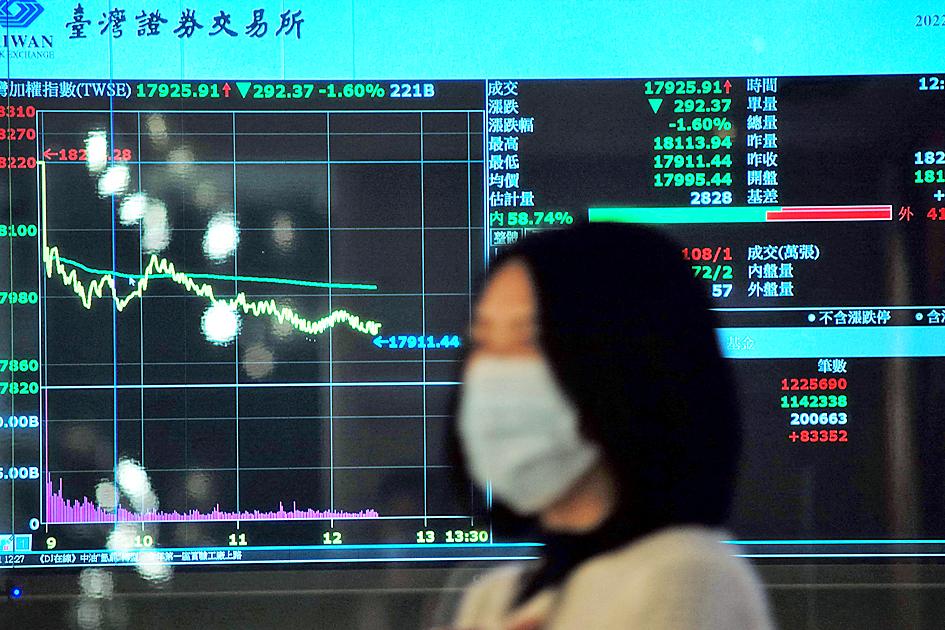Taiwanese shares took a beating yesterday as the benchmark TAIEX fell to its lowest point in almost one year, as market worries remained over planned rate hikes by the US Federal Reserve, dealers said.
The bellwether electronics sector continued its downtrend, led by large-cap semiconductor stocks, while the financial sector saw a sell-off as investors rushed to downsize their portfolios amid market volatility, they said.
The TAIEX at its close was down 359.28 points, or 2.19 percent, at the day’s low of 16,048.92. Turnover totaled NT$239.82 billion (US$8.07 billion), with foreign institutional investors selling a net NT$21.15 billion of shares on the main board, Taiwan Stock Exchange (TWSE) data showed.

Photo by Sam Yeh / AFP
Yesterday’s closing level was the lowest since May 20 last year, when the TAIEX ended at 16,042.36, TWSE data showed.
“While US Federal Reserve Chair Jerome Powell has ruled out an increase of 75 basis points in each of the upcoming policymaking meetings, the rate hike cycle has been put in place, and many investors at home and abroad are increasingly worried about liquidity being drained from the market,” MasterLink Securities Corp (元富證券) analyst Tom Tang (湯忠謙) said.
The Fed raised its key interest rate by 50 basis points in a meeting held last week after a 25 basis point increase in March in an attempt to tackle inflation.
“In Taipei, investors stayed jittery about the US markets’ performance, so they simply scrambled to further unload their holdings. Today, massive selling was seen among financial stocks, having spread from their tech counterparts,” Tang said.
The financial sector closed down by 3.4 percent, and the electronics sector fell by 1.72 percent overall, with the semiconductor subindex declining by 1.78 percent, and the transportation sector, which includes major shipping and airline stocks, declined 3.53 percent, TWSE data showed.
“Today’s turnover remained low, as many investors were reluctant to buy during the dips since they fear more losses down the road,” Tang said. “The market also remains alert to the impact on the economy from COVID-19 lockdowns in China.”

UNCERTAINTY: Innolux activated a stringent supply chain management mechanism, as it did during the COVID-19 pandemic, to ensure optimal inventory levels for customers Flat-panel display makers AUO Corp (友達) and Innolux Corp (群創) yesterday said that about 12 to 20 percent of their display business is at risk of potential US tariffs and that they would relocate production or shipment destinations to mitigate the levies’ effects. US tariffs would have a direct impact of US$200 million on AUO’s revenue, company chairman Paul Peng (彭雙浪) told reporters on the sidelines of the Touch Taiwan trade show in Taipei yesterday. That would make up about 12 percent of the company’s overall revenue. To cope with the tariff uncertainty, AUO plans to allocate its production to manufacturing facilities in

Taiwan will prioritize the development of silicon photonics by taking advantage of its strength in the semiconductor industry to build another shield to protect the local economy, National Development Council (NDC) Minister Paul Liu (劉鏡清) said yesterday. Speaking at a meeting of the legislature’s Economics Committee, Liu said Taiwan already has the artificial intelligence (AI) industry as a shield, after the semiconductor industry, to safeguard the country, and is looking at new unique fields to build more economic shields. While Taiwan will further strengthen its existing shields, over the longer term, the country is determined to focus on such potential segments as

TAKING STOCK: A Taiwanese cookware firm in Vietnam urged customers to assess inventory or place orders early so shipments can reach the US while tariffs are paused Taiwanese businesses in Vietnam are exploring alternatives after the White House imposed a 46 percent import duty on Vietnamese goods, following US President Donald Trump’s announcement of “reciprocal” tariffs on the US’ trading partners. Lo Shih-liang (羅世良), chairman of Brico Industry Co (裕茂工業), a Taiwanese company that manufactures cast iron cookware and stove components in Vietnam, said that more than 40 percent of his business was tied to the US market, describing the constant US policy shifts as an emotional roller coaster. “I work during the day and stay up all night watching the news. I’ve been following US news until 3am

COLLABORATION: Given Taiwan’s key position in global supply chains, the US firm is discussing strategies with local partners and clients to deal with global uncertainties Advanced Micro Devices Inc (AMD) yesterday said it is meeting with local ecosystem partners, including Taiwan Semiconductor Manufacturing Co (TSMC, 台積電), to discuss strategies, including long-term manufacturing, to navigate uncertainties such as US tariffs, as Taiwan occupies an important position in global supply chains. AMD chief executive officer Lisa Su (蘇姿丰) told reporters that Taiwan is an important part of the chip designer’s ecosystem and she is discussing with partners and customers in Taiwan to forge strong collaborations on different areas during this critical period. AMD has just become the first artificial-intelligence (AI) server chip customer of TSMC to utilize its advanced